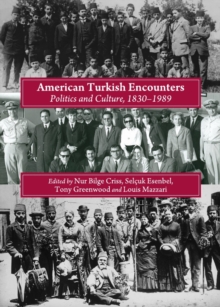Turkey and the United States have been critically important to each other since the beginning of the Cold War, although their relationship has faced a rocky road in the aftermath of developments following 9/11. Because scholarship on its roots has been relatively limited, Americans and Turks, as well as others who focus more generally on geopolitical alliances, would profit from an in-depth understanding of a history that spans the period from the beginning of the 19th century to the end of the Cold War.
The history of Turkish-American relations includes not only strategic, but also political, social, cultural and intellectual dimensions. While critical to understanding Turkish-American relations, these dimensions rarely surface in today's discourse, which reduces bilateral relations to issues currently being contested. The encounter between East and West embodied in Turkish-American interactions ranges from the official and diplomatic, to unofficial and informal exchanges at the social and individual level; while often compatible and friendly, such interactions occasionally have been less so. Authors from both countries developed a variety of perspectives on their interactions through original research that will enable both specialists and general readers to appreciate its many facets.
The American-Turkish encounter has had a profound effect on both countries. In recent years, differing interpretations of that encounter, reinforced by different perceptions of the Iran-Iraq War, have resulted in considerable rancor and contributed to a profound anti-Americanism in Turkish public opinion. That is all the more reason that a bi-national historic treatment of Turkish-American relations deserves an informed and thoughtful treatment.
In the twentieth century, while a number of studies on U.S.-Turkish relations were produced, most scholarly works were limited to the analysis of post-WWII U.S.-Turkish relations in the context of Cold War politics. Ironically, the study of American Turkish relations was not elevated to a field of area studies in Turkey even though this was probably Turkey's most important political relationship after the end of the Second World War. Even in the United States, although Ottoman-Turkish studies had its heyday in the 1960s and 1970s, it was dwarfed by a concentration on other international political concerns and crises. Consequently, there has been a gap in scholarship in the field. The editors intend that the volume will begin to fill a serious gap and encourage others to study American-Turkish relations from as many aspects as possible.
This book consists of papers that were solicited from both Turkish and American authors, many of them young scholars who were invited to a conference in June 2006 at Bogazici University in Istanbul. Subsequent to the conference, the authors were asked to develop papers that consisted of new and original work on American-Turkish relations in order to produce a comprehensive volume on the topic. This volume shows that when seen in a historical framework, the American Turkish encounter took place beyond the level of formal political and military ties during the Cold War period and has enduringly interacted at the level of educational, social, cultural realms.


